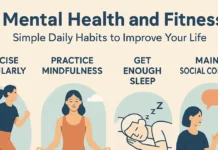Some of the links in this article are "affiliate links", a link with a special tracking code. This means if you click on an affiliate link and purchase the item, we will receive an affiliate commission.
The price of the item is the same whether it is an affiliate link or not. Regardless, we only recommend products or services we believe will add value to our readers.
By using the affiliate links, you are helping support our Website, and we genuinely appreciate your support.
Good nutrition isn’t just about eating fewer calories or following the latest diet trend — it’s about giving your body the right fuel to thrive. A balanced nutrition plan provides the essential nutrients your body needs to maintain strong immunity, steady energy, and long-term health. In today’s world, where fast food and processed snacks dominate, understanding the true impact of balanced nutrition on your immune system and overall well-being has never been more crucial.
What Is Balanced Nutrition?
Balanced nutrition refers to eating a variety of foods in the right proportions to supply your body with all the nutrients it requires — macronutrients (carbohydrates, proteins, and fats) and micronutrients (vitamins and minerals). It’s not about restriction; it’s about balance.
A well-balanced diet typically includes:
- Fruits and vegetables: rich in vitamins, antioxidants, and fiber.
- Whole grains: a steady source of energy.
- Proteins: from both animal and plant sources.
- Healthy fats: such as omega-3s and unsaturated fats.
- Plenty of water: to support digestion and circulation.
When these elements are consumed in harmony, your body operates at its best — supporting energy production, cell repair, hormone regulation, and immune defense.
The Connection Between Balanced Nutrition and Immunity
Your immune system is your body’s natural defense mechanism against infections and diseases. But without the proper nutrients, it can’t perform effectively. Balanced nutrition provides the building blocks that keep the immune system strong and resilient.
1. Vitamins That Strengthen Immunity
Certain vitamins are particularly vital for immune health:
- Vitamin C: Found in citrus fruits, bell peppers, and strawberries, it boosts white blood cell production and acts as a powerful antioxidant.
- Vitamin D: Helps regulate immune responses and reduce inflammation. Natural sunlight and foods like fatty fish and fortified milk are key sources.
- Vitamin A: Maintains the integrity of skin and mucosal barriers — your body’s first line of defense against pathogens.
- Vitamin E: Protects cells from oxidative damage, keeping your immune system robust.
Deficiencies in any of these vitamins can lead to increased vulnerability to infections.
2. The Role of Minerals in Immunity
Essential minerals like zinc, iron, and selenium are equally important.
- Zinc helps the body produce immune cells and fight viruses.
- Iron supports oxygen transport, which keeps all body systems — including immune responses — functioning efficiently.
- Selenium aids in preventing cellular damage and supports antioxidant defenses.
Including nuts, seeds, legumes, lean meats, and leafy greens in your diet ensures you get these critical minerals.
Proteins: The Building Blocks of Health
When it comes to balanced nutrition, proteins play a starring role. They’re responsible for building and repairing tissues, producing enzymes and hormones, and supporting immune function.
1. How Proteins Boost Immunity
Proteins are essential for the formation of antibodies, which identify and neutralize harmful bacteria and viruses. Without adequate protein, your body’s immune response weakens, making it harder to recover from illness.
2. Best Sources of Protein
A mix of animal and plant-based proteins ensures complete nutrition:
- Animal sources: chicken, fish, eggs, and dairy products.
- Plant-based sources: beans, lentils, tofu, quinoa, nuts, and seeds.
Variety is key — each protein source offers a unique blend of amino acids and nutrients.
How Balanced Nutrition Fuels Your Energy Levels
Have you ever felt sluggish after skipping meals or relying on processed snacks? That’s your body signaling a lack of balanced nutrition. Proper nutrition directly affects your energy and productivity throughout the day.
1. Carbohydrates: The Primary Energy Source
Carbohydrates are often misunderstood. While refined carbs (like white bread and sweets) can cause energy crashes, complex carbohydrates from whole grains, oats, and vegetables provide steady, long-lasting energy.
2. Healthy Fats: Sustained Energy and Brain Function
Healthy fats — such as those from avocados, olive oil, nuts, and fatty fish — are essential for brain health and sustained energy. They also help your body absorb fat-soluble vitamins (A, D, E, and K).
3. Hydration: The Forgotten Energy Booster
Even mild dehydration can cause fatigue and poor concentration. Drinking enough water throughout the day keeps your metabolism efficient and energy levels stable.
The Link Between Diet and Disease Prevention
A balanced diet isn’t just about feeling good in the short term — it’s your best defense against chronic diseases. Research consistently shows that proper nutrition reduces the risk of conditions like heart disease, diabetes, and obesity.
1. Heart Health
Foods rich in omega-3 fatty acids (like salmon and flaxseed) lower inflammation and improve cholesterol levels. Reducing trans fats and sodium also keeps blood pressure in check.
2. Diabetes Management
Balanced nutrition helps regulate blood sugar levels. Whole grains, lean proteins, and fiber-rich vegetables slow glucose absorption, preventing spikes and crashes.
3. Cancer Prevention
Antioxidant-rich foods — especially colorful fruits and vegetables — protect cells from oxidative stress, one of the factors linked to cancer development.
The Role of Gut Health in Immunity
Your gut microbiome — the trillions of bacteria living in your digestive system — has a profound influence on your immunity. A balanced diet rich in fiber, probiotics, and prebiotics keeps these microbes healthy.
- Probiotics: Found in yogurt, kefir, and fermented foods, they introduce beneficial bacteria.
- Prebiotics: Present in garlic, onions, and bananas, they feed those good bacteria.
A healthy gut not only aids digestion but also strengthens immune responses and reduces inflammation.
Practical Tips for Maintaining Balanced Nutrition
Achieving balanced nutrition doesn’t have to be complicated. Here are simple strategies to help you stay consistent:
- Follow the “Plate Method”:
- Half your plate: fruits and vegetables
- One-quarter: lean proteins
- One-quarter: whole grains
- Plan Your Meals:
Prepping meals ahead of time prevents last-minute unhealthy choices. - Limit Processed Foods:
Replace sugary snacks with fresh fruits or nuts. - Stay Hydrated:
Aim for at least 8 glasses of water daily. - Listen to Your Body:
Eat when hungry, and stop when satisfied — mindful eating supports digestion and weight management.
Balanced Nutrition and Mental Well-being
Nutrition doesn’t just affect your physical body — it shapes your mental health too. Nutrients like omega-3 fatty acids, B vitamins, and magnesium play a key role in mood regulation and brain function.
- Omega-3s reduce inflammation and may lower depression risk.
- B vitamins support neurotransmitter function and energy metabolism.
- Magnesium promotes relaxation and better sleep.
Balanced meals contribute to stable energy and mood, helping you feel more focused and emotionally resilient.
Common Myths About Balanced Nutrition
Myth 1: Healthy Eating Is Too Expensive
Not true! Staples like beans, eggs, rice, and frozen vegetables are affordable and nutrient-rich.
Myth 2: Carbs Are Always Bad
Carbs are your body’s main energy source. It’s refined carbs you should limit — not whole grains and fruits.
Myth 3: Supplements Can Replace Real Food
While supplements can fill minor gaps, they can’t replicate the complex synergy of nutrients in whole foods.
Myth 4: Eating Less Is Always Healthier
Starving your body slows metabolism and weakens immunity. The goal is balance, not restriction.
How to Start Your Balanced Nutrition Journey
- Assess your current diet: Note what you eat daily and identify missing


